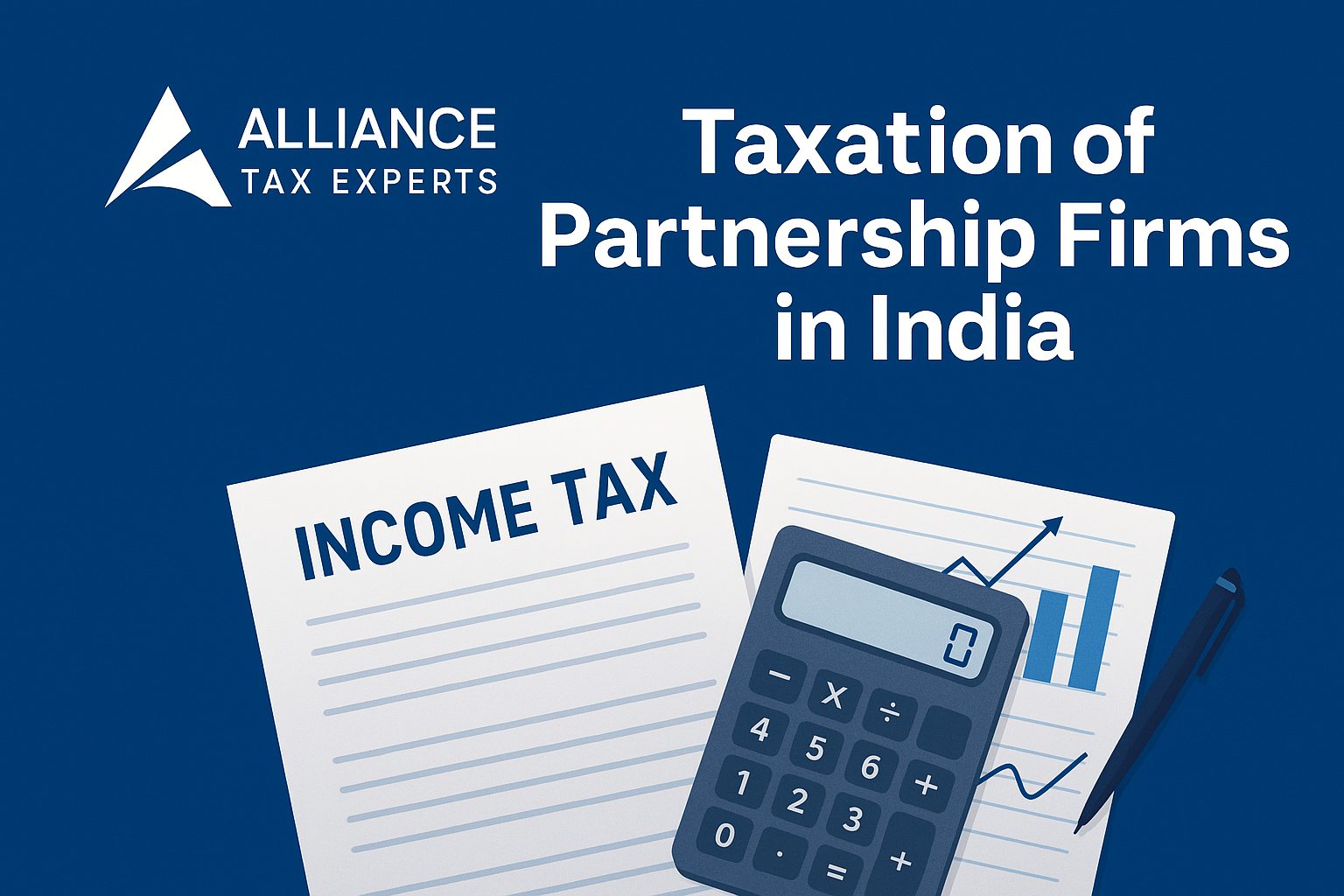
05 Jul
Taxation of Partnership Firms in India
Taxation of Partnership Firms in India: FY 2024-25 ITR
Filing Guide by Alliance Tax Experts
Are you running a partnership firm in India? Understanding
your tax obligations is crucial for avoiding penalties and ensuring smooth
business operations. As we enter Financial Year 2024–25, it's the
perfect time to review the latest tax regulations and prepare your Income Tax
Return (ITR) with expert guidance. This detailed blog by Alliance Tax
Experts will walk you through everything you need to know about taxation
of partnership firms, how to file your ITR, claim deductions, and avoid
common pitfalls.
Introduction: Why Partnership Firms Must Prioritize Tax
Compliance
Partnership firms are the backbone of India’s MSME sector,
contributing significantly to trade, services, and manufacturing. Whether it’s
a family-run business, a professional services firm, or a growing enterprise, timely
and accurate ITR filing ensures not only legal compliance but also builds
trust with stakeholders, lenders, and the Income Tax Department.
Understanding Partnership Firms in India
✅ What is a Partnership Firm?
A partnership firm is a business structure where two
or more individuals come together to run a business and share profits and
losses as per an agreed ratio.
✅ Types of Partnership Firms:
- General
Partnership – All partners share unlimited liability.
- Limited
Liability Partnership (LLP) – Offers limited liability to partners and
is registered under the LLP Act, 2008.
✅ Legal Framework:
- Governed
by the Indian Partnership Act, 1932.
- Registration
is not mandatory but highly recommended.
- LLPs
are governed by the LLP Act, 2008, offering more flexibility and
limited liability.
Taxation Overview for Partnership Firms (FY 2024–25)
✅ How Partnership Firms are
Taxed:
- Partnership
firms (other than LLPs) are taxed as separate legal entities.
- Income
Tax Rate for partnership firms (including LLPs) for FY 2024–25: 30%
on taxable income Surcharge: 12% if total income exceeds ₹1 crore Health
& Education Cess: 4% on income tax and surcharge
✅ Tax on Partners:
- Salary
and interest to partners (as per partnership deed) are allowed as
deductions to the firm.
- These
amounts are taxable in the hands of partners as
business/professional income.
Step-by-Step Guide: Filing ITR for Partnership Firms
Applicable ITR Form:
- ITR-5
is applicable for partnership firms (excluding LLPs taxed as companies).
Key Due Dates for FY
2024–25:
- Non-Audit
Firms: 15th September 2025
- Audit
Cases (under Sec 44AB): 30th September 2025
ITR Filing Process:
- Gather
Financials: Profit & Loss account, Balance Sheet, Capital account.
- Audit
(if applicable): Firms with turnover > ₹1 crore (business) or ₹50
lakhs (profession) must conduct a tax audit.
- Prepare
Computation Sheet with all deductions.
- File
ITR-5 online through the Income Tax e-Filing portal.
- Verify
ITR using DSC or EVC.
Common Mistakes to Avoid:
- Not
mentioning the correct PAN of partners
- Ignoring
tax audit applicability
- Delay
in verifying ITR or uploading audit reports
- Incorrect
classification of income or expenses
Deductions & Exemptions Available to Partnership
Firms
Eligible Deductions:
- Remuneration
to partners (subject to limits under Section 40(b))
- Interest
to partners (not exceeding 12% p.a.)
- Business
expenses like rent, salaries, depreciation, etc.
- Tax-saving
investments under specific sections like 35AD, 80JJAA (if applicable)
Importance of
Documentation:
- Ensure
that the partnership deed is updated and valid.
- Maintain
invoices, bank statements, GST returns, and ledgers to substantiate
all claims.
Impact of Recent Tax Reforms on Partnership Firms
(2024–25)
Key Updates:
- E-verification
Deadline strictly enforced—within 30 days of filing.
- Reporting
of MSME payments under Section 43B(h) may affect expense deductions.
- Changes
in depreciation rules for some asset classes.
- More
scrutiny on high cash transactions and non-filing firms.
Implications:
- These
reforms increase the need for accurate reporting and compliance-friendly
accounting.
- Non-compliance
may result in disallowance of expenses or penalties.
Expert Tips to Optimize Your Tax Liability
Tips from Alliance
Tax Experts:
- Maintain
proper books of accounts from Day 1.
- Pay
advance tax quarterly to avoid interest.
- Keep
your GST, TDS, and ITR records synchronized.
- Prepare
a financial projection and tax estimate mid-year.
- Get
your accounts audited on time and file Form 3CA/3CB + 3CD, if
required.
- Consult
professionals regularly to plan remuneration and capital withdrawal
tax-efficiently.
Why Choose Alliance Tax Experts for ITR Filing?
At Alliance Tax Experts, we specialize in:
- Accurate
ITR filing for partnership firms and LLPs
- Tax
audit support and representation
- Tax
planning, financial reporting, and compliance consultation
✅ 1300+ Clients Served Based in Vashi, Navi Mumbai Call: 9769201316
Website: www.alltaxfin.com
WhatsApp for a FREE consultation today!
Conclusion: Tax Compliance is Non-Negotiable
Running a partnership firm is exciting but comes with
serious tax responsibilities. Timely and accurate ITR filing not only prevents
penalties but also enhances your firm's credibility. With evolving tax laws,
partnering with professionals like Alliance Tax Experts ensures peace of
mind and long-term financial growth.
#alliancetaxexperts #taxconsultant #gstconsultant